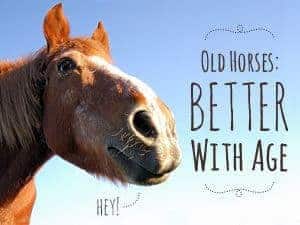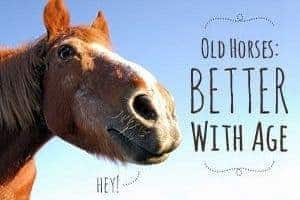What Else Can I Do?
- Topics: Old Horses: Better With Age
Most senior horse owners–myself included–want nothing more than to keep their charges healthy and kicking for as long as possible and will go to great lengths to do so. And one of the questions that many senior horse owners–myself included–have asked of veterinarians, farriers, nutritionists, barn friends, trainers, and anyone else who might provide input is, “What else can I do,” typically followed by “to keep them going?” “to fix this problem?” or something else to that effect.
I can’t recall the exact number times that phrase has crossed my lips, but I can certainly think of a few examples. Sometimes the response was a suggestion of a few options I might try to improve a certain aspect of a senior horse’s life. Last winter, then 16-year-old Dorado was having a hard time keeping weight on (not an unexpected challenge for him) despite eating more feed on a daily basis than I’ve fed an individual horse in the past. He was otherwise healthy, in good spirits, still energetic when working, and had a healthy and shiny coat to boot. I have a friend who works as an equine nutritionist, so I queried, “What else can I do to put weight on him?” She suggested providing even more feed, or trying a new supplement essential comprised of pelleted fat. I decided to give the supplement a try. She recommended we start with feeding one pound and to my delight, Dorado’s weight began increasing over a few weeks. Soon, the spring was here and Dorado looked like a million bucks. Good things come when you ask questions!
Other times, the response was more urgent, like, “You need to do this now.” Case in point: At the riding camp I used to work at, we had a lovely Thoroughbred mare in her mid-20s who was in remarkably good shape. She looked a picture of health, but over time, she got a bit sluggish in lessons, especially when working at the trot or canter. The next time the veterinarian was out, we had her check our old mare out. She found a heart murmur. She said she didn’t think it was a serious condition, likely age related, and that our mare should be all right. Then I asked the question, “What else can we do for her?” She answered (rather intensely) that we should use caution when using her in lessons and that the mare should not be trotted or cantered under saddle with students aboard, a warning we all heeded to ensure our children’s safety as well as the mare’s. Not long after I departed from the camp, a former coworker told me the unfortunate story that a newly hired instructor failed to adhere to the veterinarian’s warning; less than an hour after partaking in a lesson that included extensive trotting, our old Thoroughbred mare collapsed and died.
And finally, other times, the response is short and sweet; this happens to be my favorite kind of response. A perfect example of this comes not from my questions, but from a question asked during TheHorse.com’s senior horse care webcast in December. One participant sent in a question about her 38-year-old Quarter Horse, outlining his feeding routine and noting that most people can’t believe how old he is. She then asked, “What else should I be doing?” One of our panelists for the event, Dianne McFarlane, DVM, PhD, Dipl. ACVIM, ABVP, responded, “You are doing great to have a good looking horse at 38 years of age. Keep up the great work, I wouldn’t change a management plan that is working this well.” Sometimes there’s just nothing else you can, or should, do if a particular management plan is working–sometimes less is more
Create a free account with TheHorse.com to view this content.
TheHorse.com is home to thousands of free articles about horse health care. In order to access some of our exclusive free content, you must be signed into TheHorse.com.
Start your free account today!
Already have an account?
and continue reading.

Written by:
Erica Larson
Related Articles
Stay on top of the most recent Horse Health news with













